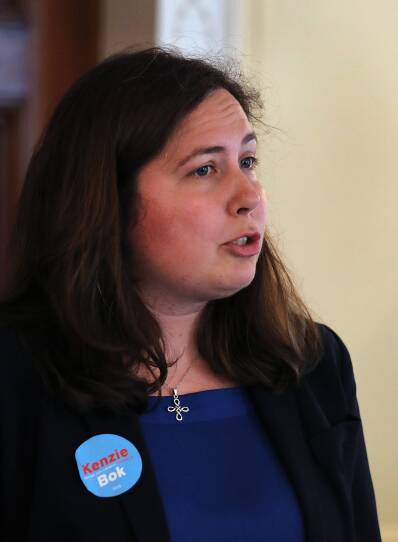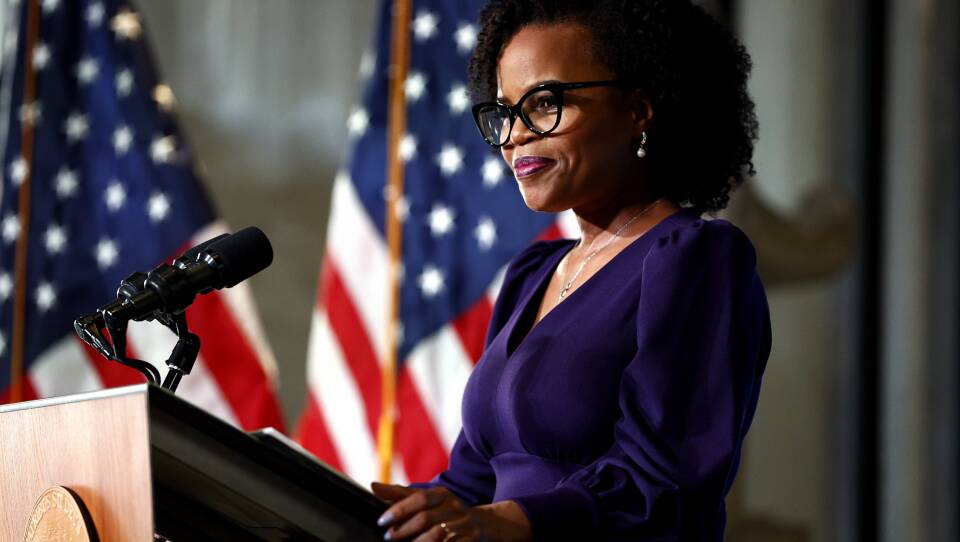On January 6, 2020, the Boston City Council held its first meeting of the new year. Early in the proceedings, after an opening prayer and the Pledge of Allegiance, at-large councilor Michelle Wu stood to nominate the council’s next leader.
“I am honored to make a motion, at the the start of this new decade and new term, for justice, equity, and opportunity for all,” Wu said. “I rise to proudly nominate our good colleague from Roxbury, Councilor Kim Janey, as city-council president."
The thunderous applause that followed Wu’s remarks suggested a landslide. So did the ensuing vote: With the exception of Frank Baker, who voted “present,” every member of the council backed Janey.
That tally was deceptive, however. A few weeks earlier, the council had been divided into two blocs. One wanted to give the presidency to Matt O’Malley, who’d been in office for nearly a decade. That group included Baker, Ed Flynn, Michael Flaherty, and O’Malley himself — as well as Andrea Campbell and Annissa Essaibi George, both of whom are now running for mayor.
A second bloc thought the new president should reflect a sea change on the council, which was about to consist, for the first time ever, of a majority of women and people of color. That group included Lydia Edwards, newly elected councilors Ricardo Arroyo and Liz Breadon, and both Wu and Janey, who are now mayoral contenders as well.
Janey, of course, has an advantage her mayoral rivals don’t. As then-city-council president, she automatically became acting mayor when Marty Walsh resigned to become labor secretary in the Biden Administration, effectively getting a months-long audition for the job. And she became council president thanks partly to support from Wu — who says she knew, at the time, that her vote could complicate her own political path.
“I can’t speak for all of my colleagues,” Wu said recently. “For me, it was certainly on my radar. Kim and I discussed it in those moments as well. There was always a chance, and in my mind a significant chance, that this could be a scenario.”
But Wu — who shared a campaign office with Janey in 2019, and became the first official mayoral candidate back in September 2020, when Walsh seemed likely to seek re-election — also says she has no regrets about her decision.
“I’m there not only to represent my constituents and propose thoughtful policies and address challenges in the community, but to help push for a transformative politics,” Wu said. “And to do whatever I could with the platform I have to push the door even wider open for young women, for people of color, for women of color especially.”
Strategically, meanwhile, Wu might not have really had a choice. Back in 2013, she'd been excoriated by progressives after backing Bill Linehan, a white, relatively conservative councilor from South Boston, for council president. In 2020, supporting a white male over a woman of color could have sparked a similar backlash and created a challenge for Wu’s upcoming mayoral campaign, even though O’Malley is far more progressive than Linehan was.
Wu wasn’t the deciding vote, however. That distinction went to Kenzie Bok, who’d just won the race for the District 8 seat formerly held by Josh Zakim.

“I was newly elected, and I had friends on all sides of that election,” Bok recalled.
Previously, Bok had worked as the budget director for Essaibi George, who was backing O’Malley. But in her just-concluded campaign, Bok had been endorsed by members of both the O’Malley and Janey contingents.
As she weighed her choice, Bok recalls, she had “great conversations” with both Janey and O’Malley. In the end, she says, her decision was driven by a belief that the council’s shift in composition was too momentous to ignore.
“I really felt a sense of history, as part of the first-ever female majority on the Boston City Council, and felt that therefore Kim was the right choice for that moment,” Bok said. “It’s meant a lot to me, as the youngest woman on the council, to be able to join the body and just instantly belong. … Kim was really aware of that historical context — of what it meant for women to not just have a place on the council, but a majority place.”
Which raises a question: What if the O’Malley camp had backed a woman? Campbell wasn’t an option: She’d just wrapped her own term as council president and couldn’t serve another due to council rules. (Asked about her support for O’Malley, Campbell said, in a statement, “To pass the gavel to another Black woman Council president for the most diverse and first-majority woman City Council in Boston’s history was a tremendous honor and joy.”) Essaibi George was, however, though it’s not clear if she was ever considered as an alternative.
Or what if the Janey bloc had settled on someone else? The group that ultimately backed Janey was, at one point, also considering Lydia Edwards, who indicated during a council meeting this year that she’s mystified by her colleagues’ interest in becoming mayor. (“Good luck to those who really want to,” Edwards said. “I don’t know why. But it’s your dream, your life. YOLO, whatever the hell the kids say.”)
If Edwards had become council president, and then replaced Walsh, the current mayoral race might look very different, with a non-candidate running the city and the various contenders running as equals. And if O’Malley had gotten one more vote back in January 2020, the same dynamic might have existed.
Recently, I asked O’Malley if he ever thinks about how close he came to leading Boston. He didn’t take the bait.
“As a wise man once said, ‘Regrets, I’ve had a few — but then again, too few too mention,'” O’Malley replied. “And I like to take Frank Sinatra’s advice on many things in life, including politics.
“I am so excited to begin my next chapter in a post-elected position, and really focus on the most important job ahead of me right now, and that’s being a new dad of a beautiful baby girl,” O'Malley added.
Ultimately, Boston’s 2020 election is a reminder that, in politics, the most minimal margins can have an enormous long-term impact. The at-large race between Julia Mejia and Alejandra St. Guillen, both of whom were expected to back Janey, was decided in a recount by one vote. And then, a month later, one vote for council president put Janey in a position to make history a year later.
Bok, who cast the vote in question, says there’s another, related lesson here worth pondering.
“Looking back, I definitely feel the weight of the fact that the very first vote I took as a councilor has ended up resulting in Kim Janey as the acting mayor, and therefore the first Black person, the first woman to lead the city of Boston,” she said.
"It’s a reminder that all those decisions matter, and you always have to be weighing things in the light of what the consequences could be.”
EDITOR'S NOTE: This article has been updated to note that Wu and Janey shared a campaign office in 2019.







